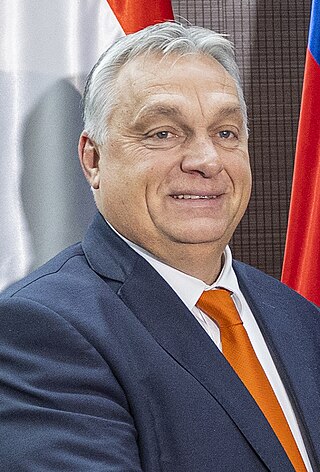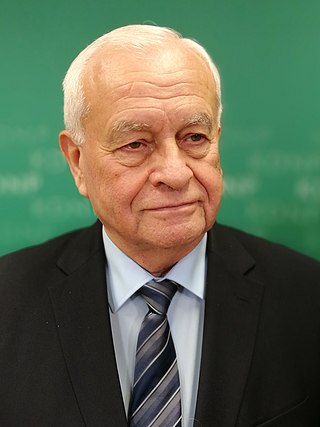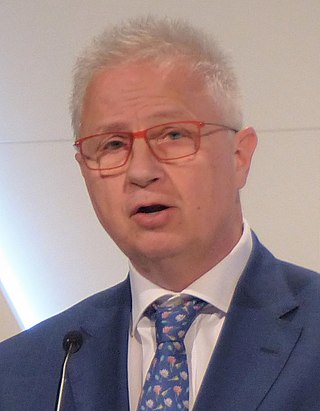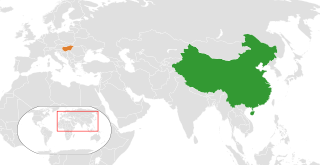The politics of Hungary takes place in a framework of a parliamentary representative democratic republic. The prime minister is the head of government of a pluriform multi-party system, while the president is the head of state and holds a largely ceremonial position. The country is "no longer a full democracy" according to the EU.

Fidesz – Hungarian Civic Alliance is a right-wing populist and national-conservative political party in Hungary led by Viktor Orbán.

Viktor Mihály Orbán is a Hungarian lawyer and politician who has been Prime Minister of Hungary since 2010, previously holding the office from 1998 to 2002. He has led the Fidesz political party since 1993, with a break between 2000 and 2003.

Gyula János Horn was a Hungarian politician who was the Prime Minister of Hungary from 1994 to 1998.

The Jobbik – Conservatives, commonly known as Jobbik, is a conservative political party in Hungary.

Tibor Navracsics is a Hungarian lawyer and politician, who served as Minister of Foreign Affairs and Trade from June to September 2014. He previously served as Minister of Administration and Justice between 2010 and 2014. He is a member of the Christian Democratic People's Party and was the European Commissioner for Education, Culture, Youth and Sport in the Juncker Commission. Since 2022, he has been the Minister of Regional Development of Hungary.
The Government of Hungary exercises executive power in Hungary. It is led by the Prime Minister, and is composed of various ministers. It is the principal organ of public administration. The Prime Minister (miniszterelnök) is elected by the National Assembly and serves as the head of government and exercises executive power. The Prime Minister is the leader of the party with the most seats in parliament. The Prime Minister selects Cabinet ministers and has the exclusive right to dismiss them. Cabinet nominees must appear before consultative open hearings before one or more parliamentary committees, survive a vote in the National Assembly, and be formally approved by the President. The cabinet is responsible to the parliament.

Hungary–Turkey relations are the bilateral relations between Hungary and Turkey. Both countries are full members of the Council of Europe, the OECD, the NATO, the OSCE and the WTO. Also Hungary is an EU member and Turkey is an EU candidate. Hungary supports Turkey's accession negotiations to the EU, although negotiations have now been suspended. Hungary has observer status in the Organization of Turkic States, in which Turkey is a full member.

Hungary–Israel relations are the foreign relations between Hungary and Israel. Hungary has an embassy in Tel Aviv and 4 honorary consulates. Israel has an embassy in Budapest and an honorary consulate in Szeged.

János Áder is a Hungarian politician and lawyer who served as President of Hungary from 2012 to 2022. He is a long-time politician of the right-wing Fidesz. As a representative of his party, he took part in the Hungarian Round Table Talks during the end of communism in Hungary in 1989. He was a member of the National Assembly of Hungary from 1990 to 2009 and served as its speaker from 1998 to 2002. He temporarily presided the Fidesz between 2002 and 2003. He served as leader of the Fidesz parliamentary group between 2002 and 2006.

Péter Pál Harrach is a Hungarian politician and theologian, who served as Minister of Social Affairs and Family in the first cabinet of Viktor Orbán from 1998 to 2002. He was one of the Deputy Speakers of the National Assembly of Hungary from 27 May 2002 to 13 May 2010. He is a member of the National Assembly of Hungary since 18 June 1998. He was leader of the Christian Democratic People's Party (KDNP) parliamentary group between 2010 and 2020.
Róbert Gajda is a Hungarian politician, member of the National Assembly (MP) from Békés County Regional List between 2010 and 2014.

Balázs Hidvéghi is a Hungarian politician. He is a Member of the European Parliament, former Director of Communications of Fidesz-Hungarian Civic Union, and former MP of the Hungarian Parliament.

Andor Nagy is a Hungarian jurist and politician, member of the National Assembly (MP) for Szécsény between 2004 and 2013. He was appointed Hungarian Ambassador to Israel in August 2013. He was accredited as Ambassador of the Republic of Hungary to Austria on 19 September 2018.

The third government of Viktor Orbán was the Government of Hungary between 6 June 2014 and 18 May 2018. Prime Minister Viktor Orbán formed his third cabinet after his party-alliance, Fidesz and its coalition partner, Christian Democratic People's Party (KDNP) altogether won a qualified majority in the 2014 parliamentary election.

László Trócsányi is a Hungarian lawyer, academic, diplomat, politician and Member of the European Parliament (MEP) since 2019. Formerly, he was the Hungarian Ambassador to Belgium and Luxembourg from 2000 to 2004, a member of the Constitutional Court of Hungary between 2007 and 2010 and Hungarian Ambassador to France from 2010 to 2014. He was Minister of Justice in the third and fourth Orbán cabinets, from 6 June 2014 to 30 June 2019.

Indo-Hungarian relations are the bilateral ties between India and Hungary. Indian embassy is located in Budapest and that of Hungary in New Delhi.

Parliamentary elections were held in Hungary on 8 April 2018. The elections were the second since the adoption of a new constitution, which came into force on 1 January 2012. The result was a victory for the Fidesz–KDNP alliance, preserving its two-thirds majority, with Viktor Orbán remaining Prime Minister. Orbán and Fidesz campaigned primarily on the issues of immigration and foreign meddling, and the election was seen as a victory for right-wing populism in Europe.
The Hungarian conservative party Fidesz has been accused of exhibiting anti-democratic and authoritarian tendencies since their return to leading the Hungarian government in 2010 under the leadership of Viktor Orbán in his second premiership. The Fidesz-led government has been accused of severely restricting media freedom, undermining the independence of the courts, subjugating and politicising independent and non-governmental institutions, surveilling political opponents, engaging in electoral engineering, and assailing critical NGOs. The Fidesz-led government has been accused of engaging in cronyism and corruption. Fidesz has been accused of antisemitism, and the Fidesz-led government has been accused of passing legislation that violates the rights of LGBT persons. Due to its controversial actions, Fidesz and its government have come in conflict with the EU on multiple occasions.

China–Hungary relations refers to the bilateral relations between the People's Republic of China and Hungary. Relations between the two countries were established in 1869 and Hungary recognized the PRC on October 3, 1949.






















